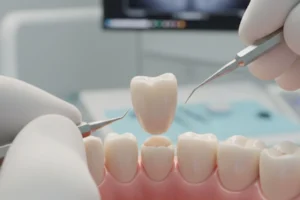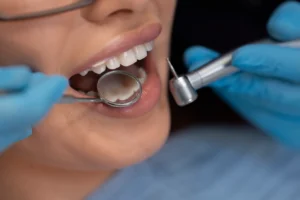How Long Does Dental Freezing Last?

How Long Does Dental Freezing Last?
Dental freezing, also known as local anesthesia, is a common part of many dental treatments. While it makes procedures more comfortable, many patients wonder: how long does dental freezing last? This guide covers everything you need to know, including average duration, factors that influence it, and how to manage numbness afterward.
What Is Dental Freezing?
Dental freezing refers to the use of local anesthetic to block nerve signals in a specific area of your mouth. This numbing effect ensures you don’t feel pain during dental procedures like:
- Fillings
- Tooth extractions
- Root canals
- Deep cleanings
It is typically administered via an injection into the gum or cheek area. Depending on the anesthetic used and the location, the numbness can last from one to several hours.
How Long Does Dental Freezing Usually Last?
The numbness from local anesthetic generally lasts between 1 to 5 hours, with some soft tissue numbness (in the lips, tongue, or cheeks) possibly lingering for up to 6 hours or more.
Typical estimates:
- For upper teeth: 1 to 2 hours
- For lower teeth: 2 to 4 hours
- Soft tissue (lips, tongue, cheeks): 3 to 6 hours
What Affects the Duration of Dental Freezing?
Several factors influence how long dental freezing lasts:
1. Type of Anesthetic Used
Some anesthetics are short-acting, while others are designed to last longer. For example, lidocaine usually wears off faster than bupivacaine.
2. Use of Vasoconstrictors
Anesthetics are often combined with substances like epinephrine, which constrict blood vessels. This slows the removal of the anesthetic from the area and extends its effect.
3. Injection Site
Nerve blocks in the lower jaw tend to last longer than infiltrations in the upper jaw due to the density of the bone.
4. Dosage Administered
Higher doses or multiple injections can prolong the duration of numbness.
5. Patient’s Individual Metabolism
People with faster metabolisms or better circulation may process the anesthetic more quickly.
6. Age and Health Conditions
Children and elderly individuals may experience different durations due to varying metabolic rates. Medical conditions that affect blood flow or the nervous system can also impact how long numbness lasts.
Why Does Numbness Last Longer in the Lower Jaw?
Numbness in the lower jaw often lasts longer due to a technique called an inferior alveolar nerve block, which targets a deeper nerve. The mandible (lower jawbone) is also denser, which slows down the absorption of the anesthetic compared to the upper jaw.
What Happens as the Freezing Wears Off?
As the local anesthetic begins to wear off:
- You may feel tingling or a “pins and needles” sensation
- Movement of lips and tongue gradually returns
- Eating, drinking, and speaking become easier
- There may be mild discomfort or pain as sensation returns, especially after dental surgery
Can You Make Dental Freezing Wear Off Faster?
While the numbing effect must wear off naturally, there are ways to encourage circulation and potentially reduce the duration:
- Light physical activity: Increases blood flow and metabolism
- Warm compress: Gently applied to the affected cheek can improve circulation
- Massage: Light, external massage of the numb area may help, if approved by your dentist
- Stay hydrated: Helps your body flush out the anesthetic
- Avoid smoking: Nicotine restricts blood vessels and may delay recovery
Dental care milton may offer reversal agents to speed up recovery, but these are not commonly used for routine procedures.
When Should You Be Concerned?
Prolonged numbness is rare but can occur. Contact your dentist if:
- Numbness lasts longer than 6 to 8 hours with no improvement
- You experience burning, swelling, or unusual pain
- There’s difficulty moving parts of your face beyond the expected timeframe
- Loss of taste, drooping of the mouth, or speech issues persist longer than normal
In very rare cases, prolonged numbness may be due to nerve irritation or damage, which typically improves over time but may require follow-up care.
Frequently Asked Questions
Q: How long does freezing last after a dental filling?
A: Typically 1 to 3 hours for the tooth area, with soft tissue numbness potentially lasting up to 5 hours.
Q: Can dental freezing last all day?
A: It’s uncommon but possible with long-acting anesthetics. If numbness continues beyond 8 hours, you should consult your dentist.
Q: Why is my lip still numb but the tooth feels normal?
A: Soft tissues like lips and cheeks can remain numb longer than teeth because of how the anesthetic is absorbed.
Q: Is prolonged numbness a sign of nerve damage?
A: Not always. Temporary prolonged numbness is usually harmless. If symptoms persist for days or worsen, see your dentist.
Summary
Dental freezing typically lasts between 1 to 5 hours, depending on several factors including the type of anesthetic used, the area treated, and your personal health profile. Numbness in soft tissues may last a bit longer, but it will gradually wear off.
Understanding what’s normal — and when to be concerned — helps reduce anxiety before dental visits. Always follow your dentist’s instructions after treatment, and don’t hesitate to reach out if something doesn’t feel right.










